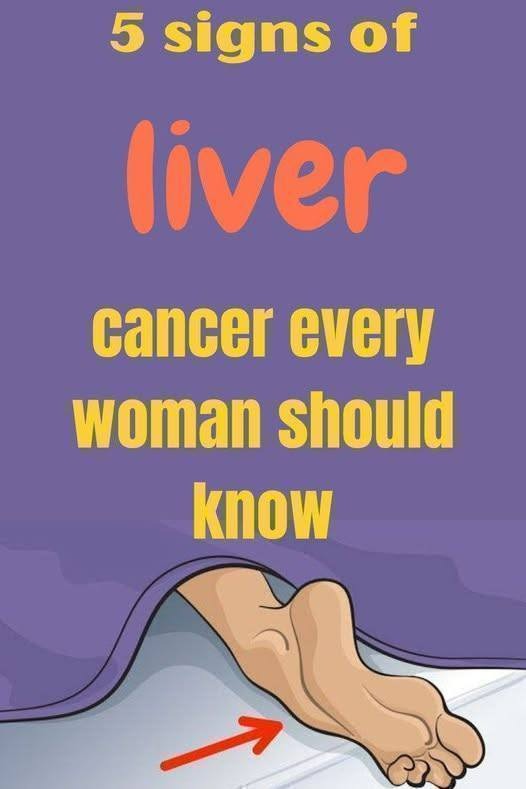
Liver cancer is one of the fastest-rising cancers in adults, and while it’s less commonly discussed than others, early detection can make a life-saving difference.
The challenge?
In its early stages, liver cancer often causes no symptoms at all.
By the time signs appear, the disease may already be advanced.
But being aware of possible warning signals — especially if you have risk factors — can help you seek care earlier and improve outcomes.
Let’s explore 5 symptoms that could indicate liver cancer, the risk factors women should know, and when it’s time to talk to your doctor.
Why Liver Cancer Is Often Found Late
The liver has remarkable regenerative power — it can function even when damaged
Early tumors don’t cause pain or noticeable changes
Symptoms often mimic fatigue, indigestion, or stress — so they’re overlooked
According to the American Cancer Society, only about 20% of liver cancers are found early enough for curative treatment.
5 Symptoms That Could Signal Liver Cancer (Don’t Ignore These)
These symptoms don’t mean you have cancer — but if they persist or worsen, they warrant medical evaluation.
1. Unexplained Fatigue and Weakness
Not just normal tiredness — but deep, unrelenting exhaustion that doesn’t improve with rest
Caused by the liver’s reduced ability to process nutrients and filter toxins
Often one of the first signs — but easily dismissed.
2. Abdominal Pain or Swelling, Especially in the Upper Right Side
Dull ache or sharp pain just below the ribs on the right side
May be accompanied by bloating or a feeling of fullness
Can indicate a growing tumor or fluid buildup (ascites)
✅ Red flag: Pain that’s new, persistent, or worsening
3. Unintentional Weight Loss and Loss of Appetite
Losing weight without trying — even if you’re eating normally
Feeling full quickly, even after small meals
May be linked to changes in metabolism or digestive function
Unintentional weight loss of 10+ pounds over 6 months should be evaluated.
4. Jaundice (Yellowing of Skin or Eyes)
One of the more recognizable signs of liver problems
Caused by a buildup of bilirubin when the liver can’t process it
Often appears with dark urine and pale stools
✅ Jaundice is never normal — always requires medical attention.
5. Nausea, Vomiting, or General Digestive Changes
Persistent indigestion, nausea, or vomiting
May be mistaken for acid reflux or stomach flu
Can result from reduced bile production
or pressure from a tumor
Especially concerning if combined with other symptoms.
Key Risk Factors Women Should Know
Having one or more risk factors doesn’t mean you’ll get liver cancer — but it increases your risk:
Chronic Hepatitis B or C
Leading cause of liver cancer — get tested if at risk
Cirrhosis (scarring of the liver)
From long-term alcohol use, fatty liver disease, or hepatitis
Non-Alcoholic Fatty Liver Disease (NAFLD)
Linked to obesity, diabetes, and metabolic syndrome — rising in women
Heavy Alcohol Use
Damages the liver over time
Obesity & Type 2 Diabetes
Increase risk of fatty liver and cirrhosis
Family History of Liver Cancer
Genetic and lifestyle factors may play a role
Women with PCOS, insulin resistance, or metabolic syndrome are at higher risk for NAFLD — a silent precursor.
✅ When to See a Doctor
If you have persistent symptoms — especially if you have any risk factors — don’t wait.
See a healthcare provider if you experience:
Abdominal pain that won’t go away
Unexplained weight loss
Yellow skin or eyes
Chronic fatigue with no cause
Your doctor may order:
Liver function tests
Ultrasound, CT, or MRI
Screening for hepatitis
Early detection saves lives. For high-risk individuals, regular screening can catch liver cancer at a treatable stage.
️ How to Reduce Your Risk
Get tested for Hepatitis B & C
Early treatment reduces cancer risk
Manage diabetes and weight
Lowers risk of fatty liver disease
Limit alcohol
Protects liver cells
Avoid smoking
Increases liver cancer risk
Eat a healthy diet
Supports liver detox and metabolism
Final Thoughts
Liver cancer may be silent — but your body is always communicating.
You don’t need to live in fear.
But you do need to pay attention — especially if you have risk factors.
So if something feels off, don’t brush it off.
Listen.
Ask questions.
Get checked.
Because when it comes to liver health, the best weapon is awareness — not alarm.